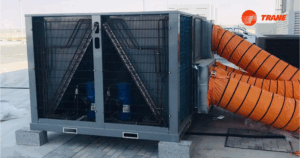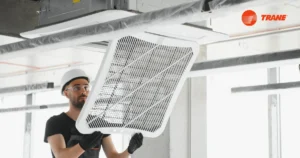Introduction
Saudi Arabia’s economy is powered by sectors such as logistics, retail, pharmaceuticals, and manufacturing, all of which depend heavily on storage facilities. In a climate where summer temperatures often rise above 45°C, maintaining optimal conditions inside warehouses is vital for both worker safety and product integrity. Reliable warehouse cooling has become more than a matter of comfort, it is a necessity for protecting productivity and safeguarding supply chains across the Kingdom.
The Challenge of Saudi Arabia’s Climate
Warehouses are particularly vulnerable to external heat, with large spaces, minimal insulation, and constant activity that drive indoor temperatures higher than outdoor levels. Excessive heat impacts not only stored products but also the workforce. Prolonged exposure to extreme conditions can cause health risks, reduced efficiency, and increased error rates, which in turn affect business performance. For sensitive goods such as pharmaceuticals, perishables, and electronics, the lack of effective cooling can result in significant financial and reputational losses.
Productivity and Workforce Wellbeing
A comfortable working environment is directly linked to higher productivity. Studies consistently show that employee performance declines in environments where temperatures are poorly managed. In Saudi Arabia, ensuring that warehouse staff have access to cooled, safe working conditions is critical for maintaining morale, reducing absenteeism, and meeting operational targets. Cooling systems also contribute to workplace safety, helping to minimise heat-related illnesses and accidents.
Protecting Sensitive Goods
Pharmaceuticals, food products, and electronic components require precise temperature management to remain usable and safe. Warehouses storing such items must maintain strict conditions to comply with industry regulations and ensure product quality. Without efficient cooling, companies risk spoilage, contamination, or malfunctions, which can lead to regulatory penalties and loss of consumer trust. For businesses aiming to expand in Saudi Arabia’s competitive market, effective warehouse cooling is not optional—it is essential.
Energy Efficiency and Cost Management
One of the biggest challenges for warehouse operators is balancing cooling needs with energy costs. Conventional systems often consume vast amounts of electricity, straining budgets and the national grid. Modern warehouse cooling solutions, however, are designed to deliver maximum efficiency by using advanced chillers, insulation techniques, and smart controls. For Saudi businesses, this translates into lower operating costs, reduced downtime, and compliance with the Kingdom’s energy efficiency standards.
Industry Applications
Warehouse cooling plays a vital role across multiple industries. In logistics and retail, it ensures timely delivery and safe storage of goods, particularly during peak summer demand. In pharmaceuticals, strict temperature regulation safeguards the efficacy of medicines and vaccines. For the food and beverage industry, cooling preserves freshness, reduces waste, and protects supply chains from disruption. Industrial manufacturers also benefit, as raw materials and components remain stable and production schedules uninterrupted.
Supporting Vision 2030 and Sustainable Growth
Saudi Arabia’s Vision 2030 sets ambitious goals for diversifying the economy and promoting sustainable business practices. Warehouse cooling aligns with these objectives by improving operational resilience and enabling companies to reduce waste and energy consumption. As e-commerce, healthcare, and industrial production continue to grow, the need for reliable and sustainable warehouse cooling systems will only become more pressing.
Partnering with Reliable Providers
The success of warehouse cooling depends on choosing a partner who understands both the local climate and industry requirements. Trane’s expertise in Saudi Arabia ensures that businesses gain access to advanced cooling technologies and tailored rental solutions. With decades of global experience and a proven track record in the Kingdom, Trane provides end-to-end support, from system design to ongoing maintenance, ensuring warehouses remain resilient in the face of extreme heat.
Conclusion
In Saudi Arabia, warehouse cooling is a strategic investment in productivity, product safety, and workforce wellbeing. As industries expand and supply chains grow more complex, maintaining reliable and efficient cooling is essential for competitiveness and compliance. By adopting advanced cooling systems, businesses not only protect their assets but also contribute to the Kingdom’s broader sustainability agenda. To complement these long-term benefits, organisations increasingly rely on flexible refrigerated containers that provide mobile, secure, and energy-efficient storage for temperature-sensitive goods.




